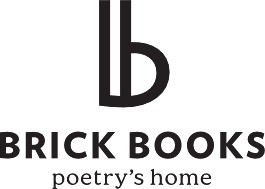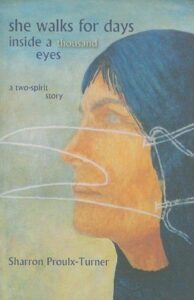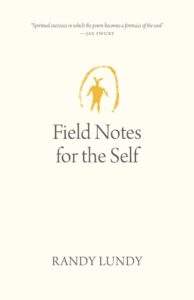Blog
Indigenous Poets Recommend
In celebration of National Indigenous Peoples Day, Indigenous poets Justene Dion-Glowa, Tyler Pennock, and Daniel Lockhart recommend books they treasure by other Indigenous poets:
*
Justene Dion-Glowa (author of Trailer Park Shakes) recommends Shopping Cart Boy by Joshua Jordan G. H (Sireton Creative, 2018).

Joshua’s collection, (written when he was just 16,) shines a light on the ongoing harms of colonialism, while poems that are courageous and unapologetically honest about his challenging experiences — experiences shared by so many others, who may take heart that they are not alone.
Tyler Pennock (author of Bones and Blood) recommends she walks for days inside a thousand eyes: a two spirit story by Sharron Proulx-Turner (Turnstone Press, 2008)
I have a copy of Sharron Proulx-Turner’s she walks for days inside a thousand eyes: a two spirit story sitting on my shelf that I opened only recently. It was signed by her with the following message inscribed:
Feb/11
… even if you don’t
read it, it’s yours!
—you are one cool
man & I
wish you
sooooo
much
luck with
that
M.F
freakin A.!
luv, Sharron
Of course, this tells a story, but one that I know differently now than I did before. Some details are missing, others have surfaced. While I’m certain we talked about my inability to read works written by people I know, it seems more likely now that she knew I would eventually open this up. And inside these pages is another message, that any story told also becomes the listener’s story:
“as every good reporter knows: each person has two sides”
Sharron Proulx-Turner’s opening chapter is a calling-in ceremony, a reminder that we are all negotiating the apparent dichotomies between our personal selves and our social selves, something I’ve seen re-enacted over many ceremonies.
The thing I like about ceremonies is that they create a space from things well-known—and thus encourage participants to reimagine their place within them. A fostered growth; where the individual’s negotiation of well-known things relies on their personal perception—something the ceremony shouldn’t dictate perfectly. This reminds me of Terese Marie Mailhot’s exploration of story through the much older story of Heart Berries, in which the Mother becomes the medicine given to the young man, where the violence against her by (bear) parents—mixed with herself—is a transmutation of her body and its intergenerational trauma, in order to create something empowering for her children.
In this, poetry is a revelatory practice. As we grow through different contexts, new perceptions grow inside to meet them. Sharron’s opening paragraph captures it better than I can, “I’ve been deep inside the colours of a rainbow twice […] the memory of that split-second moment has always made me feel like I’ve been breathing sacred colour into a painting of my every-day world.”
Sharron Proulx-Turner manages the art of speaking to future selves effortlessly—with poetry, prose, and a story spilling well outside its pages. she walks for days inside a thousand eyes is a rich ceremony, where memory and experience are re-articulated beautifully through a two-spirit perspective.
As a queer two-spirit Cree writer, I ask that you read this and any other book by any Indigenous Women. The care and mastery in this book will stay with you—its details constantly adapting to your shifting contexts, just as the protagonist did through her own.
*
D.A. Lockhart (author of Devil in the Woods) recommends Field Notes for the Self by Randy Lundy (University of Regina Press, 2010)
I came to Lundy’s work much later than I would like to admit. But know that ever since that moment, his collection Field Notes for the Self has been, for me, one of those canonical poetry books of both Indian Country and Canadian literature. This is a book of deep concrete feeling, where you come to feel the bitter Saskatchewan winter cold, sprawl out in the fragrant birdsong summers. Lundy’s work rings out like a contemporary Indigenous Ginsberg, brings profound, soulful searches of humanity and beyond. There are echoes of Gary Snyder and the tones and hues of Simon Ortiz. There are very clear and human touches of Lundy himself within each poem. This is poetry at its richest, most bold, most honest. And with lines like “Biography is what the river writes” you know that Lundy’s work is one of the absolute must-reads for Indigenous poetics and contemporary poetry in general.
While You’re Here…
 Take this short quiz to discover a newly minted poetry collection tailored to the themes that intrigue and inspire you.
Take this short quiz to discover a newly minted poetry collection tailored to the themes that intrigue and inspire you.


